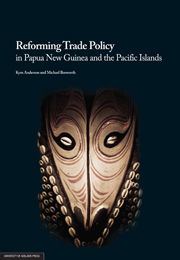Book contents
- Frontmatter
- Contents
- List of charts, tables and boxes
- Foreword, by Michael Manning
- Preface
- About the authors
- Acronyms
- Executive summary
- 1 Introduction
- 2 Performance of Pacific island economies
- 3 Implications on globalization for Pacific development strategies
- 4 Policy reforms to boost development of the Pacific islands
- 5 How can WTO help achieve Pacific island development?
- 6 The supplementary role of APEC
- 7 Choosing the way forward
- APPENDICES
- References
Foreword, by Michael Manning
Published online by Cambridge University Press: 05 June 2012
- Frontmatter
- Contents
- List of charts, tables and boxes
- Foreword, by Michael Manning
- Preface
- About the authors
- Acronyms
- Executive summary
- 1 Introduction
- 2 Performance of Pacific island economies
- 3 Implications on globalization for Pacific development strategies
- 4 Policy reforms to boost development of the Pacific islands
- 5 How can WTO help achieve Pacific island development?
- 6 The supplementary role of APEC
- 7 Choosing the way forward
- APPENDICES
- References
Summary
It is almost impossible for a meeting to be held in the world to discuss international economic issues without it being disrupted by violent demonstrations. Papua New Guineans are not immune to the distrust and bewilderment that surround these issues which affect all of us. As is so often the case when we don't understand something we hit out blindly at it. The World Bank, the IMF, WTO and APEC are all institutions that come under this mantle. They are blamed for almost everything that is supposed to be wrong with our lives.
It is fashionable to blame these institutions and the easy part is that those who do blame them can do so by merely calling their names rather than having to justify their stands or provide any evidence for what they are saying. This study is aimed at providing a reasoned argument about the effects of WTO and APEC, primarily how they affect PNG but also about how they affect other small Pacific nations.
PNG is a trading nation and will be one for a long time to come. We rely on exports for our income and our growth and we need to create the best possible conditions in which our exporters can sell to the rest of the world. There is nothing wrong with being a trading nation and many of the world's richest nations got there because they were good traders.
- Type
- Chapter
- Information
- Publisher: The University of Adelaide PressPrint publication year: 2009



